Here's the text.
Mechanisms to clean sewage
Last Updated March 11, 2024

The sewage that has entered the Tsuzuki Water Reclamation Center Tsukimizusaisei Center ( passes through five facilities for a large amount. It is released to Tsurumi River.
①Sand basin ( pump
Sewage drained from homes passes through sewer pipes and enters sand basin
In this pond remove the large garbage and sand in the sewage remove it, and pump it up with a sewage pump. First, send it to sedimentation pond.
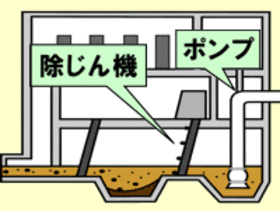
Image Figure Removing dust machine Sewage ( pump
②First, sedimentation pond
Slowly drain the sewage and sink the fine garbage that could not be removed in the sand basin and remove . I will remove it.
The sinking mud collected by a sludge scraping machine and sent to the adjusted sludge tank.
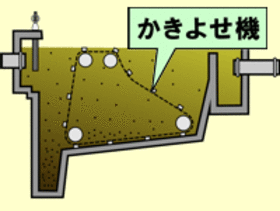
Image Figure First, at the entrance of sedimentation pond Sludge ( Sharing Machine
③Reaction tank
The mud with small creatures ( (microorganism) that cannot be seen in the eyes ( is called activated sludge.
The activated sludge ( and the water ( that first came out of the sedimentation pond S are blown in with a sprayer and stir while watching.
The sewage is polluted by small creatures ( and the water is clean.
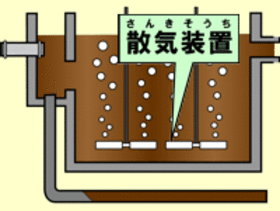
Image Figure In the reaction tank inside) Spirers (
④Final sedimentation pond
Since the water that has passed out of the reaction tank contains activated sludge it takes time to slow down the mud in this pond. Sink in.
The water in the upper part ( overflows from the triangular ( cough on the surface of the pond and flows into the contact tank. ) To do.
The sinking mud is returned to the reaction tank, and the excess mud sent to the adjustment sludge tank. )
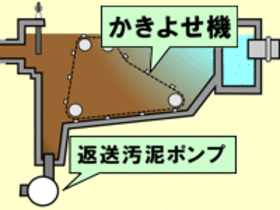
Image Figure Triangle cough Water
⑤Contact tank
The clean water is disinfected with hypochlorite sodium solution and flows to Tsurumi River
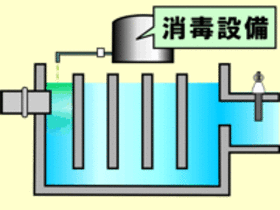
Image Figure Contact tank
⑥Adjusted sludge tank
The excess mud of the first sedimentation pond and the final sedimentation pond is submerged further and darkened.
The dark mud is sent to the northern sludge resource ( conversion center and processed.
Image Figure Adjusted sludge inside tank Choseiodei tank
Analysis of water
At the Water Reclamation Center, we check every day to see if water is clean.
In addition, a microscope also confirms the state of microorganisms ( of activated sludge
Analysis ( Beetle A beetle
At the Tsuzuki Water Reclamation Center, you can receive a request for a facility tour from time to time. For more information, please see here (link to the tour guide page).
Inquiries to this page
Sewer River Bureau Sewerage Facilities Department Tsuzuki Wastewater Treatment Plant
Telephone: 045-932-2321
Telephone: 045-932-2321
Fax: 045-931-8919
Email address: gk-tsuzukiwtp@city.yokohama.lg.jp
Page ID: 459-164-776







